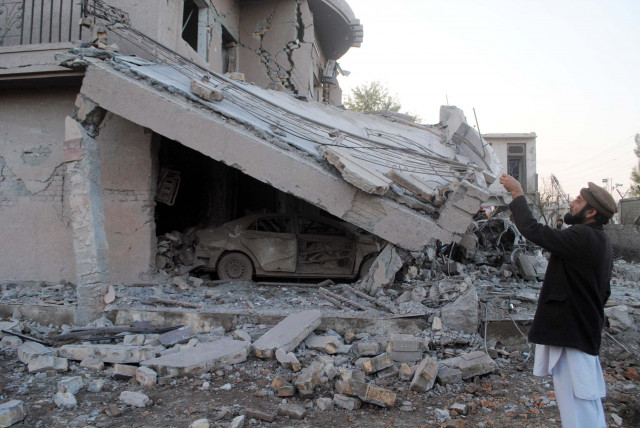Cost of war against terror glossed over
China Development Bank provides $2.23b worth of commercial loans

A person takes a photograph of one of the houses destroyed in the aftermath of terrorist attack on the Bacha Khan International Airport in Peshawar. PHOTO: MOHAMMAD IQBAL/EXPRESS/FILE
The Economic Survey of Pakistan 2018-19 that Adviser to the Prime Minister on Finance Dr Abdul Hafeez Shaikh unveiled during a press conference on Monday did not carry the chapter of cost of war against terrorism.
Dr Shaikh told The Express Tribune, “There are no more significant losses because of terrorism in Pakistan.”
However, the government has once again disclosed the terms of the Chinese loans in the survey that it had dropped from the official publication a few months ago.
Pakistan Economic Survey - Not a rosy picture
China Development Bank has provided $2.23 billion worth of commercial loans on six-month floating Shanghai Interbank Bank Offered Rate plus 2.5 per cent, which at the current rate translated into over 5.5 per cent.
The Industrial and Commercial Bank of China gave $300 million on six-month London Interbank Offered Rate plus 2.75 per cent, according to the new survey report.
But the biggest surprise was the exclusion of the cost of war chapter. A similar attempt had also been made in the past due to the pressure from the United States, but subsequently the then government had decided to publish the chapter.
In the Economic Survey of Pakistan 2017-18, the PML-N government had reported that Pakistan’s cumulative losses from war on terrorism mounted up to $126.8 billion. There was a downward trajectory in the yearly additional losses because of marked improvement in the overall security situation.
Despite sustaining huge financial losses and rendering numerous sacrifices, the US has remained reluctant to acknowledge the country’s contributions and accused its non-NATO ally of deceit.
After 9/11, Pakistan had started including the cost of terrorism in its annual economic performance presentations as the country heavily suffered on account of loss of lives, economic opportunities and damages to infrastructure.
The cost of war on terrorism used to be worked out by an inter-ministerial committee, having representation of ministries of finance, interior, foreign affairs and a Joint Ministerial Group. This time the joint ministerial committee did not hold a meeting.
Govt mulls tax levy on middlemen’s income
Compared with $126 billion previously published losses, an independent economist claimed that Pakistan’s economy sustained a colossal loss of $252 billion owing to the US-led war against terrorism, which was nearly eight times more than the financial assistance given by Washington to Islamabad.
The $252 billion price has been estimated by economist Dr Hafiz Pasha in his book titled ‘Growth and Inequality –Agenda for Reforms’.
The PTI government has also dropped a chapter on poverty, which is feared to have increased during the last almost one year due to official policies.
In the Economic Survey 2017-18, the PML-N government published the poverty statistics of fiscal year 2015-16.
The survey showed that 10.8 million people were lifted out of extreme poverty. Four out of every 10 Pakistanis were officially considered poor — as against three out of every 10 Pakistanis who were considered poor four years ago.
In absolute terms, 50.4 million were recognised as poor against the earlier figure of 60.2 million in the last survey report.
The percentage of people living below poverty line declined from 29.5% in 2013-14 to 24.3% in 2015-16, according to the previous survey.
The government also did not give fresh estimates of unemployment and reported 5.8 per cent unemployment rate for fiscal year 2017-18, which was the last year of the PML-N government.
The new survey mentioned that according to Labour Force Survey 2017-18, the unemployment rate decreased to 5.8 per cent. Overall crude participation rate decreased from 32.3 per cent in 2014-15 to 31.7 per cent in 2017-18.



















COMMENTS
Comments are moderated and generally will be posted if they are on-topic and not abusive.
For more information, please see our Comments FAQ